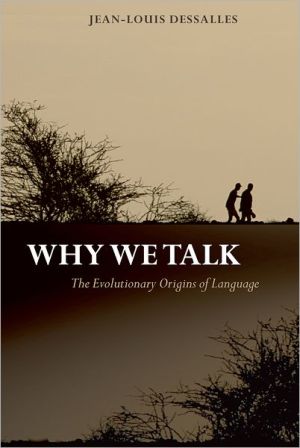Why We Talk: The Evolutionary Origins of Language
Constant exchange of information is integral to our societies. Jean-Louis Dessalles explores how this came into being. He develops a view of language as an instrument for conversation rather than mental representation and thought. Presenting language evolution as a natural history of conversation, the author sheds light on the emergence of communication in the hominine congregations, as well as on the human nature.
Search in google:
Jean-Louis Dessalles explores the co-evolutionary paths of biology, culture, and the great human edifice of language, linking the evolution of the language to the general evolutionary history of humankind. He provides searchingly original answers to such fundamental paradoxes as to whether we acquired our greatest gift in order to talk or so as to be able to think, and as to why human beings should, as experience constantly confirms, contribute information for the well-being of others at their own expense and for no apparent gain: which if this is one of language's main functions appears to make its possession, in Darwinian terms, a disadvantage. Dr Dessalles looks for solutions in the early history of human species and considers the degree to which language evolved as a means of choosing profitable coalition partners and maximizing individual success within a competitive social environment. The author opens with a discussion of the differences between animal and human communication and the biological foundations of language. He looks at the physiological preconditions for language evolution and the early evolution of meaning and communication. He then embarks on an important and original account of the natural history of conversation. Here he considers the roles of language in supporting social cohesion and information exchange. This challenging and original account will appeal to all those interested in the origins of language and the evolution of human behaviour.
Foreword ixPart I The place of language in human evolutionary history1 Animal and human communication 31.1 The biological status of language 31.2 Animal communication 51.3 From signals to behaviour 81.4 Language as code 111.5 Communication in human primates 201.6 Use of language by humans 231.7 The originality of language 282 Culture, languages, and language 302.1 Why are there many languages? 302.2 The myth of the mother language 342.3 Language and the palaeolithic revolution 422.4 The equal complexity of languages 473 The biological roots of language 513.1 The organs of language 513.2 Neuronal circuitry dedicated to language 543.3 Language learning in animals 573.4 Does animal communication entail syntax? 633.5 Language learning and universals 663.6 Linguistic abilities in neonates 683.7 The deaf children of Nicaragua 703.8 Language is a compulsory activity 733.9 The faculty of language 764 Misapp ehensions about the origins of language 774.1 That language was a necessary outcome of evolution 774.2 That evolution towards language was slow and gradual 804.3 That language was an outcome of intelligence 824.4 That in the beginning was the word 864.5 That language is a vestige of past evolution 885 Language as an evolutionary curiosity 925.1 Evolution's directionless advance 925.2 Nature appears to jump 985.3 The role of macromutation in the emergence of language 1005.4 Could language be the outcome of a quite different ability? 1055.5 Dr Pangloss's explanation of language 1086 The local optimality of language 1166.1 Between chance and necessity 1166.2 The slow and the fastin evolutionary change 1186.3 Macroevolution and microevolution in the emergence of language 1296.4 What's the point of communicating? 135Part II The functional anatomy of speech7 Putting sounds together 1397.1 The articulatory gestures of language 1397.2 Was language gestural before it became oral? 1427.3 The atoms of language: gestures or phonemes? 1457.4 Phonological structuring of languages 1507.5 Mental structures underlying the assemblies of sounds 1537.6 The nature of the rules of language 1577.7 The biological function of phonological ability 1608 Protolanguage 1658.1 Communicating just with words 1658.2 A language that is not learned 1688.3 Protosemantics 1738.4 Prelanguage, a language without sentences 1788.5 The lexicon of protolanguage 1848.6 Protoconversations 1909 The mechanics of syntax 1949.1 The phenomenon of syntax 1949.2 The importance of relations between words 1979.3 Some facts about syntax 20010 Syntax and meaning 21010.1 From protolanguage to language 21010.2 Semantic recursion and syntactic recursion 21410.3 The principle of semantic linking 21610.4 The autonomy of syntactic mechanisms 22010.5 Another form of syntax 22210.6 The origin of syntax 22911 The structure of meanings 23211.1 Concepts, images, and definitions 23311.2 Thematic segmentation 23811.3 Double meanings 24612 The emergence of meaning 25112.1 The dissociation of the two forms of meaning 25112.2 A functional role for thematic segmentation 25612.3 The emergence of human meaning 262Part III The ethology of language13 Conversation behaviour 26813.1 An apparently unimportant behaviour 26813.2 Some attempts to explain speech events 27114 Language as information 28114.1 The constraint of relevance in conversation 28114.2 Relevance in the informative mode 28314.3 Creatures responsive to information 28914.4 The biological grounding of the informative mode 29114.5 Instinctive sharing of information 29215 The birth of argumentation 29415.1 Relevance in the argumentative mode 29415.2 The idea of cognitive conflict 29915.3 The recursive nature of argumentation 30115.4 The proximal function of language 30715.5 The origin of conversational modes 31216 Language as an evolutionary paradox 31516.1 The theory of social bonding 31516.2 The altruistic character of language 31816.3 Language and cooperation 32116.4 Language and cheating 32516.5 The cost of communication 32816.6 Three stages in the evolution of language 33217 The political origins of language 33617.1 How speakers benefit by being relevant 33617.2 Presuge theory 34117.3 The political role of language in hominids 34417.4 Language as showing off 35117.5 Homo loquens or Homo politicus 35517.6 The other functions of language 35718 Epilogue 36018.1 A genesis in three stages 36018.2 A new view of language 36218.3 Future perspectives 364Afterword 367References 371Index 381








